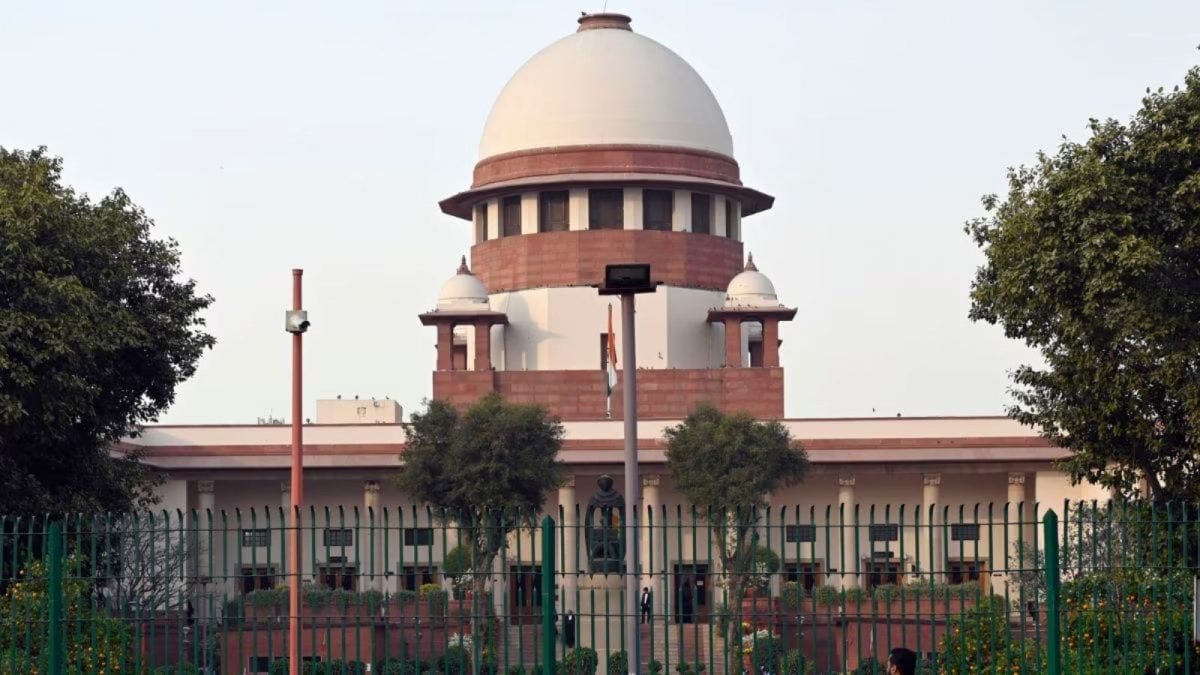[ad_1]
Last Updated:February 24, 2025, 12:21 IST
The Supreme Court dismissed Surinder Dogra’s appeal, upholding his conviction for forging an infant ticket into an adult ticket in 1997.
Supreme Court Of India
The Supreme Court recently refused to grant relief to a former traffic superintendent of Indian Airlines, posted in Jammu, who was convicted and sentenced to six months in jail for forging an infant ticket into an adult ticket in 1997, obtaining a pecuniary advantage for himself and causing loss to the Airlines.
The bench of Justices Sudhanshu Dhulia and Prashant Kumar Mishra dismissed an appeal filed by one Surinder Dogra, convicted concurrently by the trial court and the high court, for committing offences punishable under Sections 420, 468 and 471 of the Ranbir Penal Code, and Section 5 (1) (d) read with Section 5 (2) of the Prevention of Corruption Act.
It was alleged that the appellant on November 19, 1997, while manning the ticket sale counter at Jammu Airport, prepared an infant ticket in a fictitious name and tampered by way of forgery its flight coupon to make it an adult ticket.
On December 27, 1997, Romesh Malhotra, Manager (Vigilance), Indian Airlines lodged a complaint with the CBI stating that M/s Blue Bird Tours & Travel in connivance with Rattan Chand and some unknown officials of Indian Airlines, Jammu were able to procure infant tickets from Indian Airlines office, which were tampered from infant tickets to adult tickets, from shorter distance to longer distance, from infant fare to adult fare and sold to various persons.
One flight coupon in favour of one Vikram for sector Jammu to Delhi was issued by Indian Airlines for travel on November 19, 1997, but when the auditor coupon of this ticket number was checked it was found that the auditor coupon was in favour of master Azim (infant) and the sector was Jammu to Srinagar mentioned therein.
It was subsequently revealed that the appellant was manning the ticket sale counter on the said date, and he prepared the infant ticket under a fictitious name called Master Azim and deposited Rs 102 with the cashier.
Subsequently, he tampered with the flight coupon of the same ticket by way of forgery and made it an adult ticket in the name of one Vikram while changing the sector to Jammu-Delhi with a fare of Rs 3105. Thus, the appellant enabled Vikram to travel to Delhi on the forged ticket by flight no 422 on November 19, 1997, on seat no. 14.
The trial court found the relevant coupons were prepared by the appellant as it was he who was operating the ticket sale counter at Jammu Airport and his duty was to prepare and sell the Indian Airlines tickets to the passengers.
He first prepared an infant ticket in the name of Master Azim and subsequently, he incorporated a false conjunction ticket and tampered with the flight coupon of the same ticket by way of forgery showing it to be an adult ticket in the name of Vikram while changing the sector from Jammu to Delhi.
Based on the opinion of a handwriting expert, the trial court recorded a categorical finding that the auditor coupon and the flight coupon available on record were in the handwriting and under the signatures of the appellant.
The high court affirmed the finding of the trial court, upon reappreciation of evidence.
Having heard counsel for the appellant, the apex court said, “We have not found any such illegality or irregularity in the finding of guilt recorded by the Trial Court and the High Court holding the appellant guilty of committing the offence under Sections 420, 468 and 471 of the Ranbir Penal Code of 1989 and Section 5 (1) (d) read with Section 5 (2) of the Prevention of Corruption Act, 1988.”
The appellant’s counsel contended there was an absolute lack of admissible evidence to prove that the appellant had committed the forgery by manipulating the ticket.
The top court, however, said in view of the report of the handwriting expert, it was proved that on the date of offence, the appellant was discharging the duty of issuance of air tickets at Jammu Airport of the Indian Airlines and under his handwriting the questioned auditor coupon and flight coupon were issued.
“We are in full agreement with the finding recorded by the Trial Court and affirmed by the High Court that it was the appellant alone who could have manipulated the document because the subject coupons were in his possession on the relevant date,” the bench said.
The court thus found no good ground to interfere with the impugned judgment of the high court and dismissed the appeal.
[ad_2]
Source link

